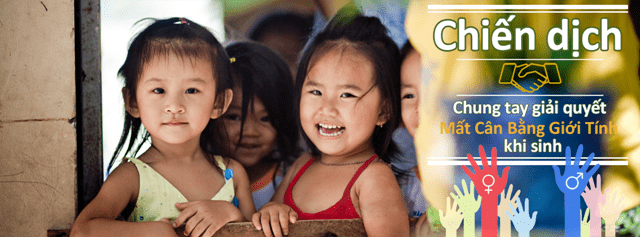HA NOI, 23 September 2014 – On the occasion of the International Day for the Girl Child (11 October), the General Office for Population and Family Planning in collaboration with the United Nations Population Fund (UNFPA) in Viet Nam launches a national campaign on “Join hands to address the Sex Ratio at Birth imbalance”.
The imbalance of Sex Ratio at Birth (SRB) is an increasing concern in some Asian countries, where about 117 million women and girls are reported as “missing”. In Viet Nam, the SRB rose from 106.2 boys per 100 girls in 2000 to 112.6 boys per 100 girls in 2013, and it is expected that this sharp trend continues. If no intervention is taken, it is estimated that by 2050, Viet Nam will confront with a scenario of an excess of around 2.3 to 4.3 million men.
Pressure on having a son
There is ample evidence in Asia and in Viet Nam to show that SRB imbalance is largely caused by gender-biased sex selection, which is driven by deep-rooted cultural norms favouring sons and placing lower values on girls. Such deep-rooted traditions place huge pressure on women to produce sons, which ultimately affects their overall social economic status as well as their sexual and reproductive lives, with implications for their health and survival.
"Many people tease someone who is giving birth to a girl. They said if a man has a daughter, he has to sit and have meals with women", said Ms. Nguyen Thi Nam, Hiep Hoa commune, Kinh Mon district, Hai Duong province.
The consequences
The imbalanced SRB will negatively affect Viet Nam’s population structure in the future, resulting in an excess of males in society. This imbalance can have grave consequences for the country’s socio-economic development and for the well-being of women, men, families and communities.
The scarcity of young women will make it difficult for a large group of men to find a marriage partner. This "marriage squeeze" as it is called is likely to have a range of severe demographic and social consequences, including a possible increase in forced marriages, trafficking and all forms of violence against women and girls, and social unrest fuelled by male social and sexual frustrations.
The challenges
Despite the official ban on sex-selection, ultrasonography and abortion services continue to be misused for purposes of sex selection. Monitoring of private health care clinics and hospitals has not been undertaken and existing sanctions are apparently not strong enough to curb sex-selective abortions. This confronts Viet Nam’s policy-makers and health care professionals with the challenge of upholding the country’s strong traditions of securing women’s health and rights through access to prenatal screening technologies and safe abortion services while also avoiding misuse of new reproductive technologies.
The challenge will be to balance between law enforcement of banning prenatal sex determination and women’s reproductive rights. The demand for prenatal diagnosis to identify the sex of the child has led to a booming private healthcare business in Viet Nam in defiance of existing laws, encouraging clients and practitioners to ignore the legal system at large.
Way forward
"The heart of the SRB imbalance issue is not sex selection, but the inequality and values. Gender-biased sex selection is exacerbated by patriarchal family values, particularly male-oriented kinship systems as well as lack of social and economic autonomy of women. Therefore, the solution is not to focus on the phenomena, but to address a broader context of socio-economic development and human rights to dismantle gender inequality so that the dignity and human rights of every woman, every young person and every individual are achieved. When women and girls have equal access to health care, education, and job opportunities as men and boys do, then they can do what men and boys are expected to do, perhaps even do better. Yet, women alone cannot address the issue; it must be done in partnership. Young men and boys must be encouraged to step forward as agents of necessary social and cultural change." said Mr. Arthur Erken, UNFPA Representative in Viet Nam.
The campaign consists of a series of activities including workshops, policy dialogues, parades in Ha Noi, Hai Duong and Bac Ninh cities, and communication activities via mass and social media with nationwide coverage.


